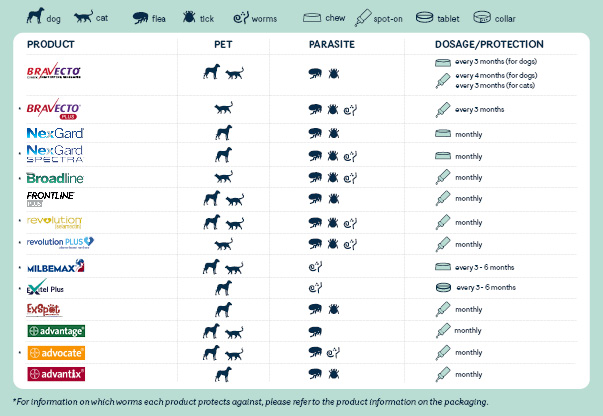
Here’s what you need to know about the dangers of fleas, ticks and worms in pets:
What’s so dangerous about flea bites for pets?
Flea bites aren’t just uncomfortable, they can lead to serious conditions that can be totally avoided if regular tick and flea treatment is given to your pet. That is why it is important to try and prevent flea bites. Flea bites can sometimes lead to:
- Allergy dermatitis | It only takes one flea bite to lead to the breakdown of the skin barrier. If your pet has a flea allergy they can itch for days!
- Tapeworm | Believe it or not, fleas can carry tapeworm eggs. If your pet tries to bite the itchy area on their skin where the fleas are, they can end up swallowing the flea and then get worms.
- Secondary infections | Constant scratching can result in secondary infections which can go on to cause more long-term discomfort (we’re talking months) for your pet.
What’s so dangerous about tick bites for pets?
Any responsible pet owner will want to know how to prevent tick bites. As most of us are familiar with tick bite fever in humans, it’s easier to understand just how nasty tick bites in pets can be. Ticks can transmit blood borne parasites and these cause conditions which are sometimes fatal, including:
- Babesiosis | This is what we know as tick bite fever and it can happen to cats and dogs. It breaks down the red blood cells and can be fatal.
- Ehrlichiosis (canine pancytopenia) | Affecting dogs, this can also mess with blood cells and can be fatal.
- Mycoplasma (feline infectious anaemia) | Affecting cats, this causes the destruction of red blood cells; high fever and a severe lack of appetite.
What’s so dangerous about worms in pets?
Worms can be easily picked up by cats and dogs (mainly by ingesting them as they sniff and taste anything and everything!). It’s also possible for puppies to pick up worms from their mother’s milk. Worms attach to the intestine and suck blood, leaching nutrients from your pet, causing:
- Anaemia | In severe cases, worms can cause anaemia.
- Intestinal blockages or irritation |Some gut problems or irritations can be put down to worms.
- They pass to the family | Worms can easily pass to each member of the family (from humans to pets and vice versa)! So it’s not only a pet problem.
How to prevent ticks, fleas and worms?
Now that we’ve established that tick and flea bites and worms can be nasty, how can you prevent them? The good news is that it is easy with ongoing treatment all year round.
The table below is a helpful guide on treatment options
Note: not all tick and flea products tackle worms too. Make sure you follow the correct dosage requirements and double check with your vet as to recommendations for puppies and kittens.

You can download this table here
Never forget again with our treatment plan
Keep track of what’s required and when with our Routine Care Guide. Download this guide, print it out and stick it on the fridge. You can also pop into your local Absolute Pets store and pick up a copy.
Get in touch
A huge thank you to Dr Candice Cooper, our Absolute Pets' Vet for sharing her expertise with us and helping us put together this article.
And remember, we are also here to help so visit your local Absolute Pets store or get in touch with us online, or on Facebook.
Happy & Healthy
Absolute Pets